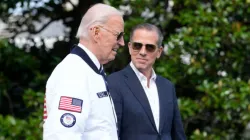Joe Biden's 'unconditional' pardon to son Hunter sparks row: Why is it controversial? Explained
US President Joe Biden on Sunday granted presidential pardon to his son Hunter Biden who was convicted of federal gun charges and tax offenses.

US President Joe Biden during the final weeks of his serving the top post granted the Presidential pardon to his son Hunter Biden triggering intense debate and criticisms from political groups, including his own party. Republicans as well as some Democrats were left fuming over his choice.
Notably, Joe Biden’s eleventh-hour pardon was heavily criticised by president-elect Donald Trump who called this “an abuse and miscarriage of Justice” in a post on his Truth Social site. The pardon comes after many promises by Joe Biden to not use the powers of his presidency for his family’s benefit. However, on Sunday he refuted all his claims and issued an official pardon to his son, sparing him a potential prison sentence for two criminal cases involving federal felony gun and tax convictions.
In the meantime, 54-year-old Robert Hunter Biden disclosed that he was under federal investigation in 2020, in connection with his business dealings in China and claims of tax and money laundering probe. He was also convicted earlier in 2024 of three felonies for lying about not using drugs while filling out a federal form during a gun purchase.
"Today, I signed a pardon for my son Hunter. From the day I took office, I said I would not interfere with the Justice Department's decision-making, and I kept my word even as I have watched my son being selectively, and unfairly, prosecuted,” Biden said in his statement.
What is Presidential pardon?
The United States Constitution gives the president the authority to grant clemency under Article II, Section 2, Clause 1, often referred to as the Pardon Clause. The key forms of the clemency includes granting commutation which reduces the sentence of a convicted person but does not eliminate the conviction itself, meanwhile, a pardon Completely forgives the crime and removes the legal consequences of the conviction.
A pardon often restores civil rights and can act as a formal statement of forgiveness but does not declare innocence.
A look at past cases of presidential pardons:
US presidents over the years have pardoned all kinds of federal offences from illegal marijuana possession to mail fraud to murder cases. Here’s a look at the recent and prominent presidential pardons.
- Joe Biden’s pardon to son Hunter Biden makes it the 26th pardon of his term. In September 2023, Biden granted clemency for three Iranians who were accused of moving $6 billion in a restricted Iranian account as part of a prisoner swap.
- Former US president Donald Trump had granted 237 acts of clemency including 143 pardons. His pardon power was also used to aid his political allies including a pardon to his political adviser Steve Bannon, who had been charged with frauding donors in a fundraising campaign. He had also pardoned Paul Manafort, an ex-official in his 2016 presidential campaign.
- Donald Trump granted pardon to Roger Stone, a longtime ally and adviser, both of whom had been convicted of offenses related to investigations into the 2016 elections.
- Barack Obama had granted clemency to over 1900 people during his term including hundreds who had been convicted of non-violent drug offences.
- Bill Clinton, on the last day of his office in 2001 pardoned his half brother March Rich, which sparked widespread controversy. Rich, who had pleaded guilty and also spent a year in prison, was a fugitive convicted of financial crimes and whose ex-wife had donated significantly to Democrats and the Clinton campaign.